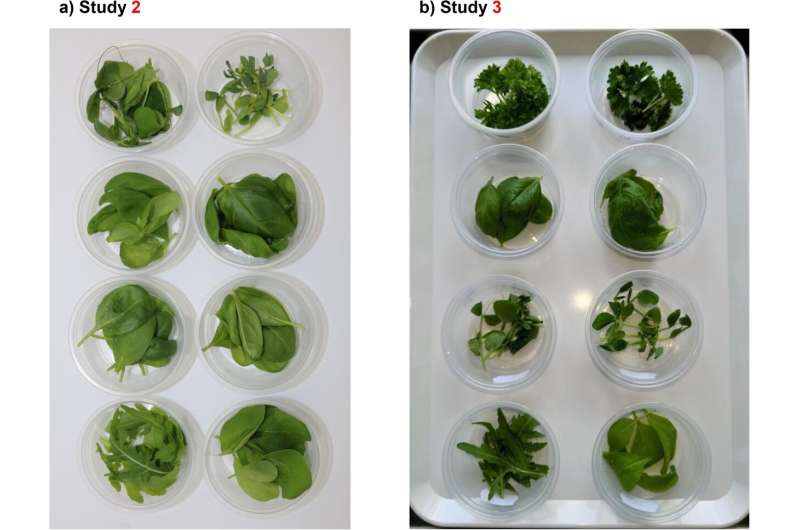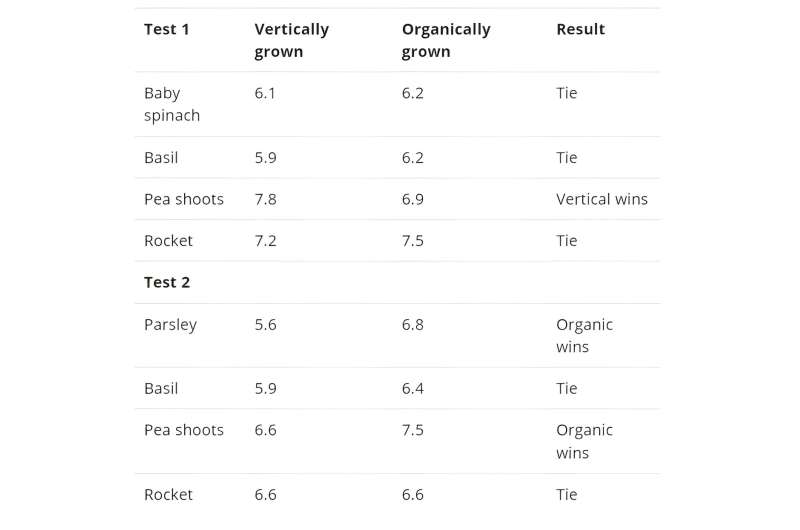This article has been reviewed according to Science X's editorial process and policies. Editors have highlighted the following attributes while ensuring the content's credibility:
fact-checked
peer-reviewed publication
trusted source
proofread
Vertically farmed greens taste as good as organic ones

Consumer skepticism about the taste of vertically farmed greens is widespread. But the first scientific taste test from the University of Copenhagen and Plant Food & Research, New Zealand, shows that respondents rate greens grown vertically and without soil as just as good as organic ones.
Bland. Pale. Artificial. These are just a few of the prejudices that Danish consumers have about vertically farmed veggies. But plants grown indoors, stacked and without soil, have the potential to increase food security, provide more space for nature and ensure access to leafy greens and herbs year-round with short transport to consumers.
In the first study of its kind, researchers from the Department of Food Science investigated whether consumer prejudices hold true. In the study, researchers asked 190 participants to blind taste and rate rocket (arugula), baby spinach, pea shoots, basil and parsley, which were all grown organically and compare them with the same veggies grown by way of vertical farming.
The results of the study show that the test subjects like vertically-farmed products nearly as much as they do organic, soil-grown grown products. The findings are published in the journal Food Quality and Preference.
"In terms of taste, we certainly have no reason to be skeptical. Indeed, the participants think that the vertically grown plants taste just as good as the ones we consider best—namely the organic ones," says Associate Professor Michael Bom Frøst, one of the researchers behind the study.

Close race in the vegetable battle
Overall, the organic greens narrowly beat out the vertically grown ones in the study, but the participant ratings are very close. For example, it was an absolute dead heat when participants had to rate rocket on a scale of 1–9, with 9 tasting best. Here, both rocket salads received a score of 6.6.
Also, the two varieties of baby spinach and basil were rated so closely that there was no real difference between them. Pea shoots were tested twice, with each type getting a win. The only clear winner for participants was organically grown parsley.
As such, the study debunks some of the prejudices that previous studies have shown with regards to consumer attitudes about vertically grown vegetables. While consumers are generally positive about the technology, they also have very low expectations of vegetables grown this way.
For example, they discount the possibility of vertically grown leafy greens and herbs tasting as good as organic ones. They also don't think that they're natural and healthy. And according to Michael Bom Frøst, this is a very natural prejudice.
"It's an example of the concept of neophobia, a psychological trait that we all have to varying degrees. It means that some consumers are not that happy about trying new things. This can be a major obstacle for new technologies and it is important to address through information and consumer education," he says.
"This study clearly demonstrates that consumer prejudices about vertically grown products are debunked as soon as they taste them."
Food security, sustainability goals and space for nature
According to the study's lead author, Sara Jaeger, the new result paves the way for vertical cultivation to become more widespread than today. The farming method offers numerous advantages.
"Throughout history, technologies have been invented by humans to put food on the table. Vertical farms are grown under totally controlled conditions, which means that there is enormous food security in relation to attaining the same yield year after year," says the researcher.
"The latest evaluation of the UN Sustainable Development Goals shows that we need to both accelerate and alter the trajectory of development. Food security, climate action and biodiversity protection are all headed the wrong way. Our food system is incredibly central to achieving the Sustainable Development Goals," she says.
One of the great advantages of vertical cultivation is the large amount of space savings, as one can both grow upwards in stacks and harvest more frequently than by outdoors growing. This would allow for more agricultural land to be rewilded. Furthermore, cultivation facilities can be built close to big cities, allowing for a much shorter journey from producer to consumer. However, it is a form of cultivation with high investment costs. As such, global uncertainty and inflation are thwarting opportunities.
"Thirty percent of our land mass in the EU is set to be protected nature. So, somehow, we need to concentrate food production in less space. This is where an increase in vertical cultivation could well be the answer," Michael Bom Frøst concludes.
Results from the taste test
The researchers divided participants into two groups, who rated the tastes of vegetables on a scale of 1-9, where 1 was "dislike extremely" and 9 was "like extremely."
More information: Sara R. Jaeger et al, Consumers' expectations and experiences of salad greens, herbs, and fruits from vertical farming: Comparison with organic produce, Food Quality and Preference (2023). DOI: 10.1016/j.foodqual.2023.105020
Journal information: Food Quality and Preference
Provided by University of Copenhagen




















